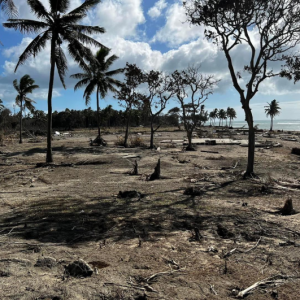Welcome to “What’s Up With Water,” your need-to-know news of the world’s water from Circle of Blue. I’m Eileen Wray-McCann.
In Syria, a strategically important dam that was supposed to be protected from airstrikes was in fact the target of a U.S. bombing campaign during the war against Islamic State. The New York Times reports that a top secret special operations unit in the Defense Department bombed the Tabqa Dam on March 26, 2017. The bombs were designed to fracture concrete, and were some of the largest in the military’s conventional weapons arsenal. The Defense Department said that the airstrikes were meant to retake control of the dam, which was in the hands of Islamic State. The dam was upstream of Raqqa, the Islamic State’s command center, and it supplied drinking water, electricity, and irrigation water. If the bombs had caused the dam to collapse, it would have threatened tens of thousands of lives. The dam did not collapse in the bombing, but it suffered badly, with damage to its electrical systems and flood gates. Right afterward, dam operators could not release water downstream and the reservoir behind the dam was rising quickly. An emergency cease fire was called so that engineers could stabilize the structure’s control systems and release water, averting a catastrophe. Six months later, in October 2017, Syrian forces regained control of Raqqa.
In the United States, the rising cost of water in one major American city is hurting people of color. A study released by two urban planning nonprofits found that majority-Black neighborhoods in Chicago hold ten times as much water debt as majority-white areas in the city. The study also found that in 2019, customers without a water meter, paid an average of $500 more per year for water than metered customers. Chicago residents without meters are concentrated in the city’s majority-Black and majority-Latino neighborhoods. The study authors say that some homeowners are “unable to pay off the snowballing debt,” noting that half of the water debt owed to Chicago comes from delinquent bills. Chicago’s water debt struggles are part of a national problem. In 2020, Circle of Blue researched a dozen large cities and found 1.5 million households behind on their water bills. Collectively, those households owed more than $1 billion to their water departments. Since December 2020, the federal government has allocated over a billion dollars for water debt relief, but due to administrative hurdles that money has been slow to reach families in need.
In the United Kingdom, water companies are again under scrutiny for improperly handling wastewater. An analysis by the BBC found that seven water companies dumped raw sewage into U.K. waterways more than 3,000 times in the last five years. Sewage pollution is a long-standing issue in the UK.. Activists say that the federal Environment Agency is not doing enough to stop illegal dumps, and that current laws are not strict enough. Water UK represents the water companies – it said they understand the “urgent need for action” to stop polluting rivers. But they also questioned the accuracy of the findings.
And that’s “What’s Up With Water,” from Circle of Blue, where water speaks. More water news and analysis await you at circleofblue.org. This is Eileen Wray-McCann – thanks for being here.






